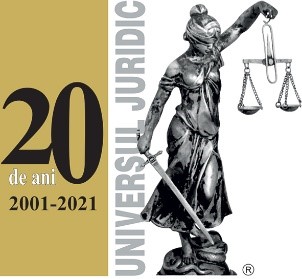Archives
-

LIMITELE EXERCITĂRII DREPTULUI DE PROPRIETATE PRIVATĂ
No. 2 (2024)Proprietatea este un drept elastic, adaptabil la interesele societatii. Indiferent ca este privita ca suma a prerogativelor pe care le confera asupra unui bun sau ca relatie de apartenenta, proprietatea ramâne unul dintre drepturile naturale, inviolabile si sacre ale omului.
Aproprierea individuala a bunurilor constituie o evolutie in domeniul proprietatii, dat fiind ca aproprierea colectiva, cunoscuta ca prima forma posibila de apropriere, chiar daca este expresia interesului unei colectivitati, reprezinta o modalitate de nivelare a aproprierii individuale. In societatile democratice, cele doua forme de apropriere sunt obligate sa coexiste; relatia lor nu este sau nu ar trebui sa fie una antagonica, ci complementara. Atunci când aproprierea colectiva serveste intr-o mai mare masura intereselor societatii, aproprierea individuala trece in plan secund. Niciodata insa aceasta forma de apropriere nu trebuie sa dispara, deoarece reprezinta o garantie a libertatii individului in societate, un indicator de evolutie sociala si de bunastare materiala.Limitele dreptului de proprietate sunt cele care contureaza sfera de libertate a individului in relatia cu bunurile sale si permit afirmarea functiei sociale a proprietatii. Rolul limitelor in exercitarea dreptului de proprietate este de a echilibra interesele individuale intre ele sau de a concilia interesele individuale cu interesul general, in scopul optimizarii accesului la utilitatile oferite de bunuri. Prin contractul social indivizii se obliga sa respecte legile cetatii, fiecare trebuind sa isi exercite dreptul astfel incât si ceilalti sa isi poata exercita propriul drept. Fiind restrângeri in exercitarea proprietatii, limitele trebuie sa fie minim invazive si insotite de plata unor compensatii sau despagubiri juste.
Acest volum nu si-a propus sa ofere o analiza completa a limitelor in exercitarea dreptului de proprietate. Dimpotriva, lectura studiilor la care am facut referire va aduce perspectiva diversitatii, a detaliilor, a particularitatilor limitelor dreptului de proprietate, care trebuie privite nu numai prin prisma restrictiilor pe care le presupun, ci si prin cea rolului lor de protectie a proprietatii, de asigurare a coeziunii sociale, a echilibrului, de garantare a libertatii individuale.
Asadar, invit cititorii sa parcurga textele care urmeaza, din pozitia editorului recunoscator contributorilor valorosi care s-au alaturat acestui proiect. -
CAPACITATEA JURIDICĂ
No. 1 (2024)Modificarea paradigmei asupra conceptului de capacitate juridica s-a realizat, dupa intrarea in vigoare a Codului civil, in sensul garantarii ei tuturor persoanelor, al transformarii ei intr-un concept cat mai inclusiv si mai aproape de fiinta umana, al excluderii oricaror criterii de selectie a persoanelor care isi pot exercita drepturile si al delimitarii capacitatii juridice de cea mentala sau de orice grade de inteligenta in formularea oricaror drepturi in conformitate cu vointa si interesele persoanei. Astazi, capacitatea juridica nu mai poate fi privita ca un simplu inlocuitor al capacitatii mintale, aceasta ramanand o creatie a legiuitorului care implica, in mod prioritar, personalitatea umana si individualitatea fiecarei persoane fizice sau juridice.
-

NOŢIUNEA DE INTERES ÎN CODUL CIVIL: CONVERGENŢE ŞI DIVERGENŢE
No. 4 (2023)Noțiunea de interes în Codul civil: convergențe și divergențe este tema ultimului numar al Revistei Româna de Drept Privat (4/2023).
Porțile – prin care termenul interes, cu multiple accepții în limbajul comun și în cel economic, a intrat în Codul civil, dobândind sensuri juridice specifice – sunt redeschise și cercetate de autori prestigioși, în studii originale și profunde: Marieta Avram (Interesul superior al copilului: un concept supraordonat. Propuneri de lege ferenda privind separația judiciara a parinților); Lucian Bercea [Clauza penala, între executarea eficienta și (ne)executarea (in)eficienta]; Lucian Bojin (De ce cred ca mai bine renunțam sa ne întrebam „ce este interesul social?”); Silviu Cerna (Interesul general și relevanța acestuia); Marian Nicolae (Interesul general în Codul civil și în Codul administrativ); Cristian Paziuc (Interesul persoanei vulnerabile, vector al noului regim al ocrotirii persoanei fizice); Ionuț-Florin Popa (Metamorfoza bunelor moravuri); Dan Andrei Popescu și Alina Oprea (Legitimitate și interes în circuitul privat internațional. Observații privind competența internaționala în materie de divorț și raspundere parentala); Radu Rizoiu [Interesul poarta fesul. Deci este el o persoana (juridica)?]; Irina Sferdian (Interesul privat și servituțile de utilitate publica); Valeriu Stoica (Diferite perspective asupra noțiunii de interes în Codul civil); Lavinia Tec (Despre utilitatea „interesului societații”) și Viorel Terzea (Contractele administrative și Codul civil. Interesul public versus interesul privat).
Aceste porți prin care termenul interes a trecut din limbajul comun și din cel economic în limbajul dreptului privat, în primul rând, în textele Codului civil, au facut posibila stabilirea unui regulament de joc al desfașurarii acțiunilor umane, cu obiectivele lor multiple: economice, civice, politice, artistice sau sportive. Jocul este echitabil daca regulile sunt rezonabile. Formele receptarii termenului interes în cadrul normativ al acestui joc al desfașurarii acțiunii umane masoara atât caracterul rezonabil al regulilor, cât și caracterul echitabil al jocului.
Secțiunea Varia cuprinde doua studii, unul al lui Cristian Cealera (Natura juridica a plații) și altul al lui Vladimir Diaconița (Tratamentul juridic al cesiunii unui brevet de invenție anulat ulterior contractarii), în care sunt investigate, cu subtilitate juridica și rigoare logica, doua probleme care invita mereu le reflecție.
Lectura placuta! -

TIMPUL GARANȚIILOR ÎN VREMEA SCHIMBĂRILOR
No. 3 (2023)Numarul RRDP dedicat garanțiilor incearca sa puna „sub semnul discuției” aceste preconcepții. Veți gasi aici argumente pentru flexibilitate și schimbare aduse de reprezentanți din toate zonele dreptului (privat). Schimbarea nu inseamna neaparat modificarea „literei” legilor existente, ci mai degraba o citire a lor in cautarea „spiritului” de care au nevoie pentru a fi folositoare. Iar domeniul garanțiilor se dovedește a fi o sursa inepuizabila de surprize. Este un domeniu care a facut tranziția de la mentalitatea de clan („there is safety in numbers”) la conștiința apartenenței la Unul („ex pluribus unum”). Este suficient sa ai un concept unitar pentru a rezolva o multitudine de situații particulare. Doar ca trebuie sa ințelegi rațiunea unitații și sa accepți multiplele ei fațete. Pentru tradiția creștina asociata, de regula, Romaniei, acest „paradox” al unitații de esența (οὐσία) și multitudinii de valențe (ὑπόστασις) nu ar trebui sa surprinda pe nimeni.
-

PROPRIETATEA ÎN DREPTUL AFACERILOR
No. 2 (2023)Volumul de fața reunește o serie de studii care au stat la baza intervențiilor susținute cu ocazia celei de-a douasprezecea ediții a Conferinței Naționale de Drept Comercial, cu tema Proprietatea in dreptul afacerilor, organizata in vara anului 2022 la Timișoara. Evenimentul a dezbatut probleme actuale privind prerogativele, formele, modalitațile, regimurile și aplicațiile proprietații in acest domeniu. Dintr-o perspectiva generala, discuțiile au abordat rolul drepturilor reale in mecanismul aproprierii bunurilor, valoarea ca trasatura a bunurilor sau a drepturilor patrimoniale, diferențele conceptuale lucru – bun – drept, respectiv (in)existența unui regim comun al bunurilor incorporale. Totodata, din perspectiva specifica dreptului afacerilor, au fost analizate subiecte legate de proprietatea corporativa, proprietatea asupra criptoactivelor/token-urilor, proprietatea asupra conturilor din aplicații și a datelor personale sau in cadrul platformelor și rețelelor digitale/virtuale.
-
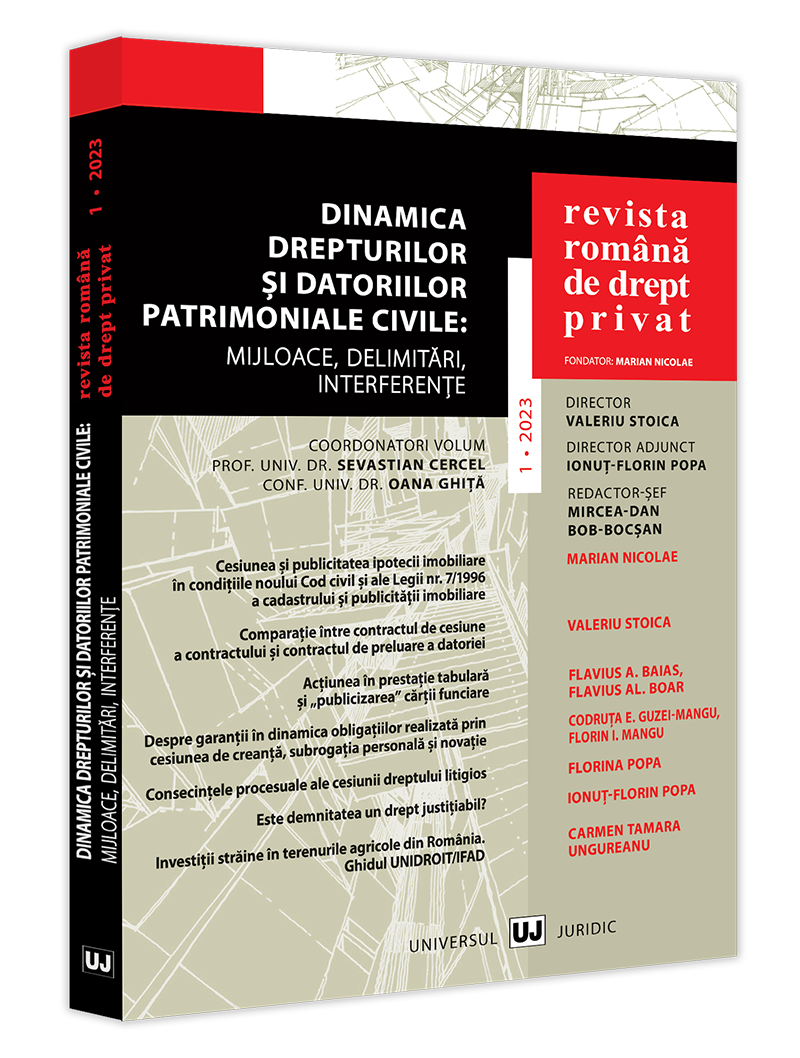
DYNAMICS OF CIVIL PROPERTY RIGHTS AND DEBTS: MEANS, DELIMITATIONS, INTERFERENCES
No. 1 (2023)Apparently, the theory of civil rights and duties would enjoy the greatest longevity in the context of the institutions of the Civil Code. In reality, the formal law under which the changes in living law are hidden reflects the deceptive permanence of the evolution of the law of obligations, adapted to the great social currents. The peculiarity of regulating extremely varied situations and rising from concrete facts to general notions is reflected in the trend towards the standardization of this level of civil law in civilized countries, reflected including in the Romanian Civil Code from 2011. An issue dedicated to the dynamics of rights and civil patrimonial debts, of the Romanian Journal of Private Law, was inspired by the National Conference "Dynamics of Civil Rights and Obligations", a topic in the area of concern of Professor Liviu Pop, who was awarded the title of Doctor "Honoris Causa" of the Faculty of Law of the University of Craiova, on this occasion. The topics debated bring to light current, controversial issues on multiple levels and which confirm H. Capitant's statement according to which "obligations form the basis of legal life".
-
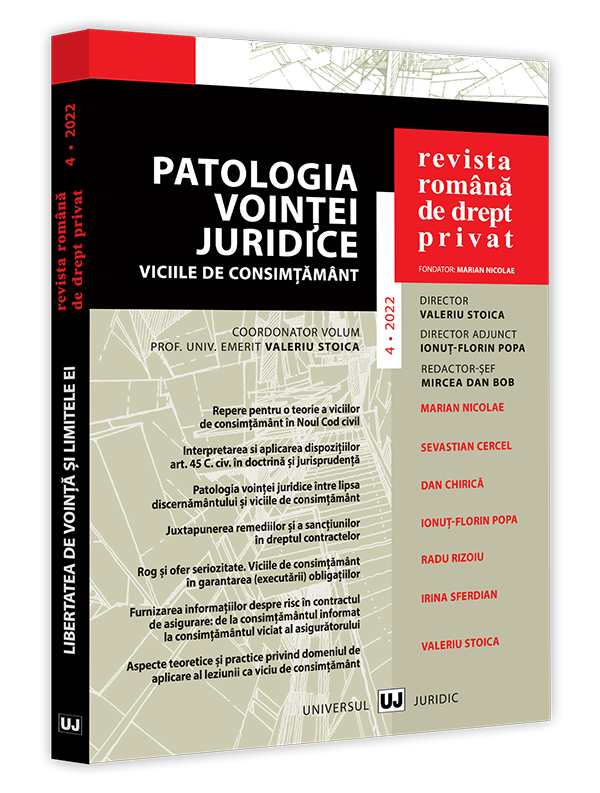
PATHOLOGY OF THE LEGAL WILL – VICES OF CONSENT
No. 4 (2022)To be, to know, to be able to, to have to, to choose, to want, to do and to have are not only the verbs that structure the image that the Romanian language offers of community dynamics, but also the logical-legal instruments through which the law projects , realizes and defends the order of the community. It is no accident that the verb to want is the indispensable auxiliary for the future tense and the previous future. The will builds the future, on the basis of knowing and deciphering the relationship between possible and necessary, assuming the freedom and responsibility to choose an action or an inaction and fulfill it, thus enriching the common deposit of the past and the present, built with the verb to have, with autonomous role (present tense) or auxiliary (compound perfect).
The legal will has three appearances in this string of verbs, which have become logical-legal instruments: first, as the will of the legislator, it is a source of legal norms, i.e. of positive law; secondly, it accompanies actions and inactions, impregnating them with the imprint of subjectivity, through compliance or non-compliance with legal norms, a relationship from which the idea of guilt is born; finally, the legal will, in an almost miraculous way, becomes itself through expression (simple or in a certain form) an action, an accomplished fact, objectifying itself in unilateral, bilateral or multilateral legal acts. In this third appearance, the will, once expressed (manifested), directly gives rise to legal effects (the rights and duties of the parties), without the interposition of the verb to do. However, it reappears to allow the exercise of rights and the execution of debts.
In order for the legal effects to be born validly, it is necessary that the legal will, in the last appearance, be healthy. The state of health or illness of the legal will can only be diagnosed by relating the verb to want to the verbs to know, to be able to, to have to, to choose, i.e. to the freedom of those who conclude legal acts. Error, deception, violence and injury, traditionally called vices of consent, are pathological states of the legal will, because the freedom of the parties is affected by a constraint (violence), by external elements that limit or exclude the possibility of choice (injury), by the wrong representation of reality, autonomous (the error) or induced by another person (the delusion).
-
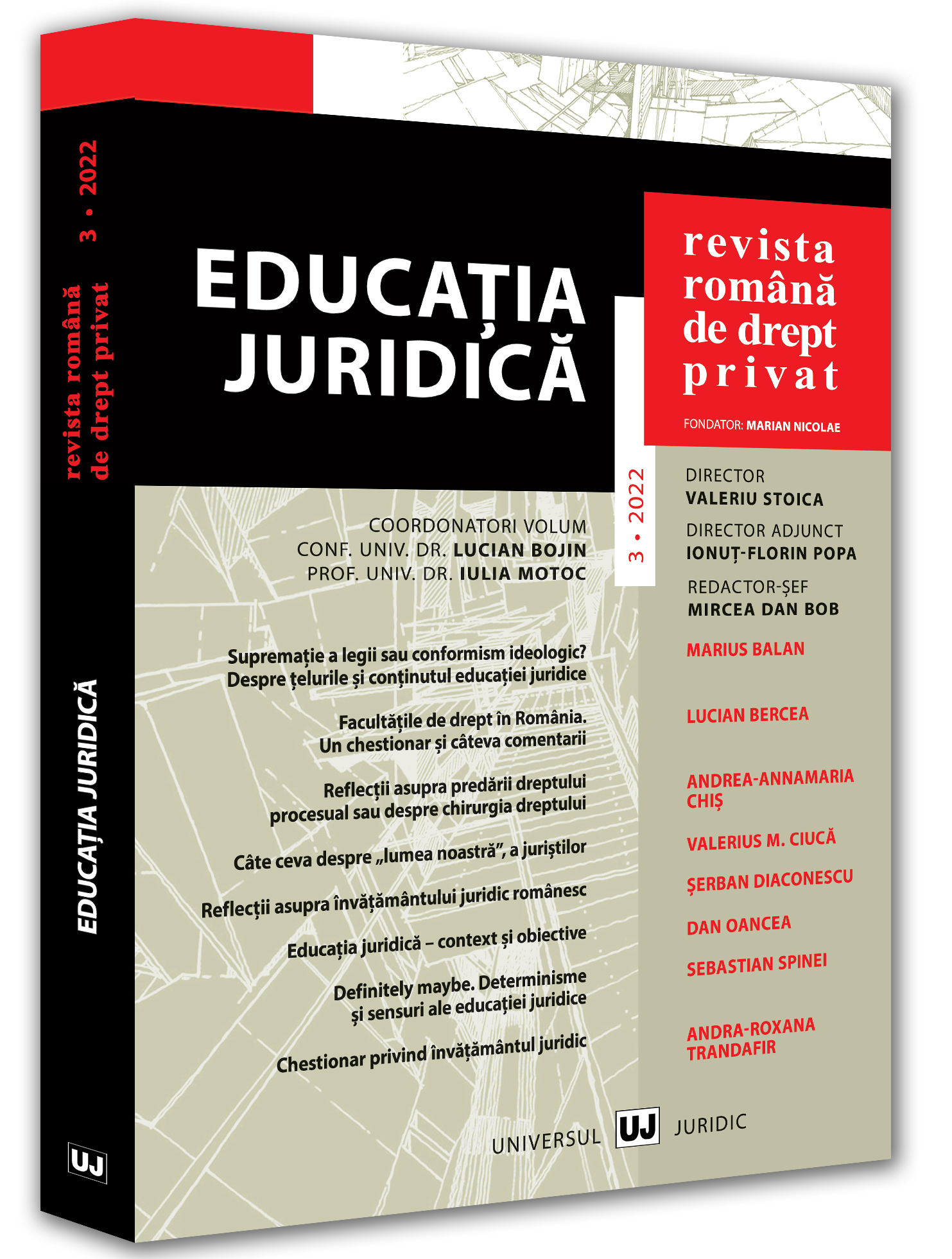
Legal education
No. 3 (2022)Issue 3/2022 of the Romanian Journal of Private Law is a thematic issue which, along with some articles on legal doctrine on the classical model (in the Varia section), contains a "dossier" dedicated to legal education in Romania.
21 law professors from Romania (including some who teach abroad) answer a questionnaire that addresses the main topics of reflection on legal education: its position in the general education system, the objective of legal education, the content of the curriculum, the teaching and examination methods, the connection with legal education in other countries, reform proposals.
The texts of the authors who accepted the invitation to contribute to this issue are similar in structure, which makes them easy to read. However, they are varied in content, offering a wide (and therefore representative) range of images of legal education in Romania. You will be able to read interesting characterisations of Romanian legal education as well as challenging proposals.
The texts in this issue are of interest to all those who teach law, but also to law students and other stakeholders in legal education, especially the legal professions. This issue is, in fact, an invitation to dialogue for all of the above about what is at stake in legal education and how its goals can best be achieved.
In the context of this year's wider debate on learning, a dedicated look at legal education can be an important contribution, especially as the lucidity of the analyses in this issue has nothing to do with the "festivity" of many official positions on the issue of education in general.
-
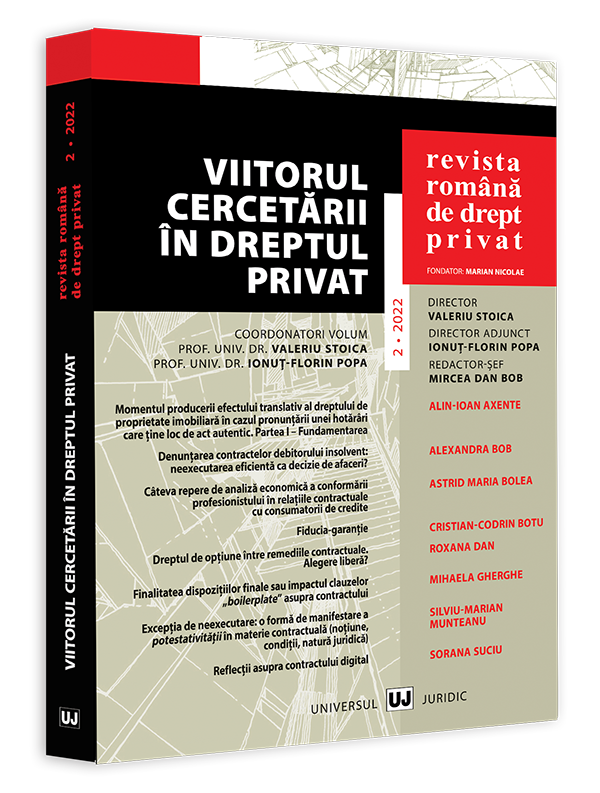
THE FUTURE OF PRIVATE LAW RESEARCH
No. 2 (2022)The last few years, as they could be reflected in the pages of the Romanian private law magazine, probably the most serious magazine in the area of Romanian private law, attest, unfortunately, to some form of unilateralism. This feature is due to the presence, perhaps too frequent, of the same authors and, implicitly, to the lack of new authors that sufficiently prove the consistency of their interest in private law. We wondered if this situation has its cause in a particular lack of inclination of lawyers in Romania towards research or if it is somehow a question of a wrong policy of the editorial office. In order to be able to reach a conclusion, we proposed to search and promote the novelty, by inviting some young researchers to write (some at the very beginning of this path, others already tested by the pages of the magazine). We believe that our approach paid off, because the idea was received by several doctoral schools (Bucharest, Cluj-Napoca, Timișoara) that offered an extremely interesting and varied selection base. The front volume is a selection of some of the ongoing doctoral studies and is intended to be a small manifesto for the promotion of research in Romanian private law. Whether this research has a future or not is a question to which we invite you, the readers, to answer and we thank you for the essential contribution to the survival of the research: reading the magazine!
The authors of the essays in this volume come from representative legal professional environments. They are magistrates, lawyers, notaries, legal advisors, academics with concerns worth cultivating. They all belong to Romanian doctoral schools (without implying that there would be no research outside this institutional framework, only that this fact simplified our selection effort!), and the published works are sometimes part of their doctoral research, sometimes simply a topic of interest to the author.
The themes addressed in the volume are extremely varied, without covering the entire range of central subjects of private law. For example, the economic analysis of the contract is used for particular areas, such as: the termination of the contracts of the debtor in insolvency, as a form of non-execution of the contract or as an opportune business decision; compliance of the professional in the contracts concluded with credit consumers. The frequent theme of promises of alienation is also the subject of relevant essays, dedicated, for example, to the remedy of the court decision that takes the place of a property transfer contract or regarding the correlation (respectively the competition) between the implied inalienability clause in the promises of real estate alienation and insurance measures within the criminal process. The subject of the qualification of the contract is also addressed, both in a general study and in another, dedicated to the electronic contract. The generous topic of remedies for non-performance is also exploited in several studies dedicated to the right to choose between contractual remedies, the exception of non-performance and liquidated damages in case of non-performance of the obligation to perform. At least two studies address the issue of special clauses, such as "boilerplate" clauses and "credit acceleration" clauses. They are joined by a series of inter-domain studies that deserve the reader's full attention: about the guarantee function that the trust contract can fulfill, about the relationship between the subjective right and the material right to action, about the "impossibility" of the transfer of possession, respectively about the nature of the obligation to ensure the transmission of ownership over another's property.
On the other hand, as will be seen, the essays themselves are not equal in many respects. Their inequality does not necessarily mean a lower or greater inclination of the authors for research, but rather an oscillating preoccupation between theoretical and practical, respectively a proportional approach to them. In all cases, we tried to intervene as little as possible in the content of the papers, to leave the evidence of research fresh and to offer a relatively correct perspective on a sector of research in our country.
-

Electronic commerce
No. 1 (2022)The volume in front is the result of good legal research intentions. It is intended to draw the attention of the Romanian legal community to the challenges posed by the evolution of the information society and the possible far-reaching changes it may bring about in traditional law. The idea behind the texts is related to checking the resistance of common law to new legal formulas, as well as its ability to reshape itself according to the modern demands of the information society. This is why one of the persistent questions (which can be found throughout some of the studies collected in the volume) is whether we can speak of a law of electronic contracts or a law of electronic commerce. Or, more generally, can one speak of a law of the digital society, aimed at regulating various aspects, from the ownership and control of digital elements, digital contracts, liability for digital products, for the "acts and deeds" of artificial intelligence, the protection of personal data, to the digitisation of current procedures in company law, procedural law, public law, etc.?
The approximate answer and, moreover, the premise from which we started is that, if we can speak, for practical or heuristic reasons, of a law of electronic contracts, just as we could speak of a law of e-commerce or another law of legal "specificities", we cannot speak from a technical-legal perspective of an autonomous law of electronic contracts (or artificial intelligence or e-commerce).
The mere regulation of the specificities (which may take the form of exceptions) of certain areas of law does not necessarily lead to the conclusion of the autonomy of the law relating to that area of regulation. Consequently, as pointed out by reputable authors, terms such as 'computer contracts' or 'electronic contracts', or 'electronic content', 'electronic services' and a whole list of specialised terminology are in reality only 'descriptive expressions', leaving it to the jurist to identify how this specialised law is subject to the general principles of ordinary law. In the case of Romania, this common law is none other than that of the Civil Code, and its general principles are precisely those enunciated directly or indirectly by it. As will be seen in some of the studies in this issue, even the creative conception of the legislator in this matter is permanently referable to common law, whether we refer to the European legislator or the national legislator.
As for the content of the volume, it is marked by variety and incompleteness. These potential shortcomings could be eliminated by volumes devoted to specialised studies. For the time being, the limits of the Romanian jurists' desire to write have forced us to produce an eclectic volume. The same limitations have also prevented us from providing a complete picture (at least from a legal point of view) of the challenges posed by electronic tools. But we are convinced that, despite its shortcomings, this volume will be a useful source of self-verification of legal reasoning for lawyers in Romania.
-

Relationships in Private Law - Accesory/Subsidiary/Incidental
No. 2 (2021)As for issue 2/2021, it has been produced under the coordination of Prof. Dr. SEBASTIAN SPINEI, has as its theme RELATIONSHIPS IN PRIVATE LAW - ACCESSORY/SUBSIDIARY/INCIDENTAL and brings together 16 valuable studies on this subject.
-

Classification of legal acts in private law
No. 1 (2021)As far as issue 1/2021 is concerned, it was produced under the coordination of Prof. Lucian Bercea, being dedicated to the qualification of legal acts in private law and gathering 24 valuable studies on this subject.
-

What we know and what we want: Conceptual interferences and boundaries in the Civil Code
No. 4 (2020)As far as issue 4/2020 is concerned, it was produced under the coordination of Prof. Valeriu Stoica and brings together, in a volume entitled "What we know and what we want: Interferences and conceptual delimitations in the Civil Code", numerous valuable studies analysing the notions of good faith, diligence, error, fraud, fraud, bad faith, guilt (intention and fault).
-

Non-material Damages
No. 3 (2020)The idea of "moral damages" and, correlatively, the idea of "reparation" for such "damages", ideas that have been rejected since antiquity, have long been considered "shocking" and "illogical". Instead of arguments, a few rhetorical questions: how to consider that a moral value, not susceptible to "destruction" or "deterioration", can nevertheless be "repaired" by a monetary equivalent; how to admit that money can replace tears, that suffering can be evaluated in money, even in relation to its degree of intensity? How can you admit that pain and suffering can cease or become more bearable in relation to the amount of the increase in the bank account?
These are the essential fragments - sublimated into emblematic, precise and expressive words. Multiple levels legitimise the debate, since moral damage is one of those constants of the legal current that exhaust the arguments without monopolising the truth of compensation.
-

Civil liability in the context of the current challenges
No. 2 (2020)Despite its "venerable age", civil liability remains a legal institution capable of constantly surprising with previously unknown valences and surprising with its capacity to adapt to the eternal transformations of society. This is why a volume that places civil liability in the context of contemporary challenges is not only useful, but above all necessary. Although the subject matter allows for an almost inexhaustible number of topics to be addressed, the 10 articles on the subject, contained in RRDP No 2/2020, are sure to attract readers' attention and spark productive doctrinal debate, given the quality of the material and the ideas put forward.
-

Civil Code: in search for third parties
No. 1 (2020)There are almost 400 references to third parties in various texts of the Civil Code, which create as many normative contexts. In addition to these, there are those in which third parties are disguised, bearing other names, such as creditors and heirs (when the latter do not become parties). The most important normative context in which third parties appear is that of the effects of the contract, a context which extends to the effects of the legal act in general; this context also includes third-party beneficiaries. The broadest context, made up of legal rules which are found in many areas of the Civil Code, is that of enforceability, by reference to a legal act, a legal fact in the narrow sense, a legal relationship or a subjective right. The contracting third party or, in a narrower sense, the acquiring third party often appears, wearing either the veil of good faith or the veil of bad faith. Sometimes the third party is represented, sometimes it is representative. The third party is sometimes the victim and sometimes the payer. There are cases where the third party sees that his own property is the subject of contracts concluded by other persons. The third party may not only be a payer, but also a payer, and sometimes a guarantor. The third party can be assigned in a legal relationship. The third party may have a special power, determining the subject matter of the contract in general or the price in the contract of sale in particular. Precisely because the family of third parties is extremely diverse, some of them cannot be placed in a particular category, and remain entirely specific cases. After reviewing the texts and normative contexts in which third parties appear, one conclusion can be drawn: the logic of the general and the special remains alien to them; the only way in which the Civil Code has been able to civilise these savages has been to trap them in the web of meaning of each normative context.
-

The autonomy of labour law
No. 4 (2019)This issue of the Journal, dedicated to Labour Law, has been produced with the contribution of the members of the "Society of Labour Law and Social Security" and represents an important and, we hope, useful presence of the Association in the current doctrinal debate on the positioning of Labour Law within the branches of law that make up the Romanian legal order.
This subject, especially the one concerning the autonomy of Labour Law, has been the object of theoretical dispute in the recent past, especially in the dialogue with some authors of Civil Law, and the significant contributions of Prof. Dr. I.T. Ștefanescu and Prof. Dr. A. Țiclea have had the gift to mark the normative competence of Labour Law in relation to Civil Law.
In fact, the Association has proposed, through the will expressed by its members and recorded, as such, in its constitutive acts, to be an "actor" on the scene of doctrinal debates, as well as a promoter of solutions for optimizing labour law or, as the case may be, a useful support for legal practitioners in the understanding and application of the legislation on legal labour relations.
In its capacity as an affiliated organisation of the International Society of Labour and Social Security Law, the Association aims to provide a suitable institutional framework for the exchange of ideas between lawyers specialising in its field of expertise and activity and to promote concrete ways of supporting the process of improving the professional training of young researchers and practitioners through ongoing collaboration on a partnership basis with approved educational service providers.
We would like, in concluding these lines, to express our gratitude to the RRDP management and, in particular, our thanks are addressed to Prof. Dr. Valeriu Stoica for his solicitude in hosting the studies published in an issue of the journal, dedicated to Labour Law, as well as his good offices in finalizing the publication of the journal, in legal form and substance, which we hope its readers will appreciate.
-

Representation in Private Law
No. 2 (2019)Frecventa relatiilor contractuale de astazi ne obliga sa nu le mai putem concepe fara participarea intermediarilor. Doctrina subliniaza de cateva secole relevanta economica a reprezentarii. Aceasta tehnica are abilitatea interesanta de a comprima spatiul si timpul acolo unde reprezentatii nu pot fi prezenti, de a profesionaliza intermedierea relatiilor contractuale, de a simplifica magistral incheierea contractelor prin utilizarea reprezentantilor experimentati sau de a oferi asistenta celor care nu pot actiona in nume propriu din pricina lipsei capacitatii. Mai mult, epoca industriei a adus dupa sine chiar obligativitatea utilizarii reprezentarii acolo unde parte a unui act juridic este o persoana juridica.
Fictiunea juridica a reprezentarii, vazuta de Ernst Rabel ca un „miracol juridic” prin care reprezentatul este legat in mod direct de actele incheiate de reprezentant, constituie o institutie fundamentala a dreptului privat. De aceea, nimic mai firesc decat sa-i acordam importanta cuvenita! Pentru inceput, un volum dedicat reprezentarii in dreptul privat reuneste cateva studii care urmeaza unele dintre temele centrale ale acestei institutii juridice. Departe de pretentiile unei harti complete a institutiei, volumul semnaleaza cateva dintre punctele de interes ale amplei reforme a dreptului reprezentarii oferite de Codul civil din 2011.
Prezentul volum are ca origine si pretext o conferinta care a avut loc in 24 octombrie 2018 la Bucuresti, dedicata reprezentarii si datorata initiativei intelectuale si nu numai a profesorului Valeriu Stoica. Din pacate, nu toate sustinerile prezentate in cadrul acestei conferinte se regasesc in prezentul volum. Din fericire insa, alte studii s-au adaugat subiectelor dezbatute cu aceasta ocazie, dovedind ca pretextul a fost de bun augur.
Fara sa cuprinda o prezentare sistematica a mecanismului actual al reglementarii, fiecare studiu cuprinde propria sistematizare a subiectelor abordate, astfel incat are calitatea de a putea fi utilizat independent de celelalte. Linia comuna a tuturor acestor contributii o constituie complexitatea reprezentarii. Aceasta se poate observa si in opiniile adesea divergente intre chiar autorii studiilor. In pofida divergentelor, ne putem bucura ca solutiile practice care raman in urma acestora nu mai sunt atat de divergente precum motivarile lor!
Un survol al volumului, mai degraba impresionist, dar apt sa ofere o imagine de ansamblu, releva cateva teme principale asupra carora autorii s-au oprit. Vom prezenta foarte pe scurt unele dintre subiectele care anima cercetarea cuprinsa in acest volum.
Intrucat mecanismul reprezentarii nu este nicidecum un dat, ci un rezultat complex ilustrat de istoria dreptului, una dintre teme este dedicata dreptului roman si reticentei cu care acest sistem juridic privea reprezentarea si intr-o anumita masura evolutiei primare a acestei institutii (Mircea Dan Bob). Substanta reprezentarii implica o neliniste majora din perspectiva calificarii pe care trebuie sa o ofere teoria generala a dreptului civil si, mai exact, teoria generala a drepturilor subiective, dar si din perspectiva delegarii exercitiului autonomiei de vointa. In aceasta privinta, cel putin trei studii (Valeriu Stoica, Marieta Avram si Radu Rizoiu) includ o dezbatere interesanta legata de putere, autoritate, facultate si drept in cadrul reprezentarii, cu implicatii practice imediate, mai ales in privinta reprezentarii persoanelor juridice si a persoanelor fizice lipsite de capacitate, dar nu numai. Tema reprezentarii persoanei juridice, mai ales din perspectiva urmarilor pe care trebuie sau poate sa le aiba incetarea de drept a puterii de reprezentare a administratorului unei societati, face obiectul dezbaterii in mai multe dintre studiile cuprinse in volum (dar, cu titlu principal, in cel al Irinei Sferdian).
Contractul de mandat, in cateva dintre aspectele sale, este si el vizat de mai multe studii (cu titlu principal insa, de cel al lui Dan Chirica). Ampla tematica a posibilelor distinctii intre simulatia prin interpunere de persoane si mandatul fara reprezentare este prezenta si ea (Flavius-Antoniu Baias si Valentin Ciltea), alaturi de cea a falsei reprezentari si consecintelor acesteia in planul efectelor obligatorii si in planul raspunderii (in principal, Ionut-Florin Popa). Intrucat unele dintre cele mai complexe probleme ale dreptului international privat se deruleaza in jurul mecanismului reprezentarii transfrontaliere, un amplu studiu care demareaza cu o vasta analiza de calificare din perspectiva dreptului comparat este dedicat acestei tematici (Dan Andrei Popescu). Tema relatiilor dintre soti poate sa o implice si pe cea a reprezentarii dintre acestia, motiv pentru care subiectul a fost si el abordat (Marius Floare). Intrucat mecanismul reprezentarii este o formula juridica de o amploare deosebita, trebuie sa ne intrebam in ce masura ipoteze juridice relativ curente ii imprumuta din structura si substanta. In aceasta privinta, doua studii analizeaza conexiunile posibile intre actiunea oblica si mecanismul reprezentarii (Ioan Ilies Neamt) si intre reprezentare si detentie ca expresie a posesiei pentru altul (Adrian Tamba).Desigur ca multe aspecte ale hartii reprezentarii raman descoperite. In primul rand, volumul vizeaza doar reprezentarea in dreptul privat. Cu toate acestea, pentru ca virtutea Codului civil este, si in materie de reprezentare, aceea de a fi dreptul comun si pentru alte ramuri de drept unde se intalneste reprezentarea, el va constitui, speram, un pretext pentru o dezbatere similara in dreptul public, de exemplu. In al doilea rand, regretam lipsa din acest volum a unor contributii care ni s-ar fi parut extrem de utile pentru intregirea sa tematica, dar pentru care timpul autorilor vizati nu a fost ingaduitor, si nadajduim ca viitorul o sa aduca la lumina si aceste contributii astazi absente.
In fine, speram in utilitatea acestui demers si multumim practicienilor si teoreticienilor dreptului care s-au lasat antrenati si stimulati intr-o maniera surprinzatoare, mai ales prin amplitudinea emiterii de opinii, de intrarea in vigoare a Codului civil, oferind dezbaterii numeroase solutii pentru iesirea din imobilismul vechiului drept al reprezentarii.
-

Law and economy: Two mirrors of the same reality
No. 1 (2019)In this issue of RRDP, we have tried to collect a series of texts written by Romanian authors who analyse certain areas of law (and) through the prism of the economic effects produced. Economic analysis is more than a simple form of justification for the adoption of a certain normative solution. It is becoming more and more useful in the concrete application of the law, through the tools it offers the interpreter to find the right solution in the (sometimes) contradictory regulatory environment. The reader will find here both systemic views (on the morality of economic analysis, on legal fictions lacking economic rationale in company law, on how tax law combines law and economics at the normative level, even on how the public interest can be analysed through an economic prism), as well as specific analyses (risk in public contracts, fraud through reticence, the opportunity cost of non-performance, set-off, the treatment of claims in insolvency, injury, consumer protection, champerty credit, credit facilities, bank credit enforcement or electronic signatures).


